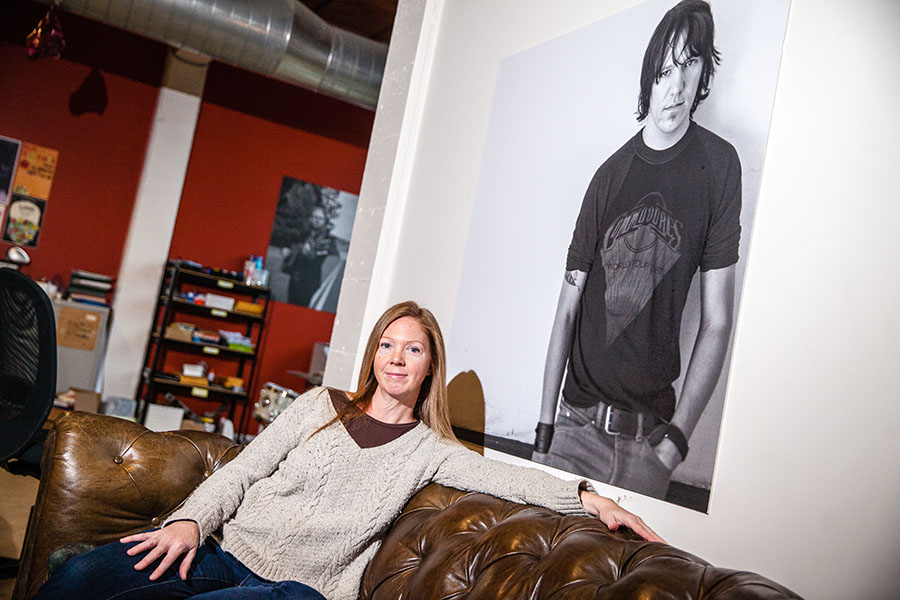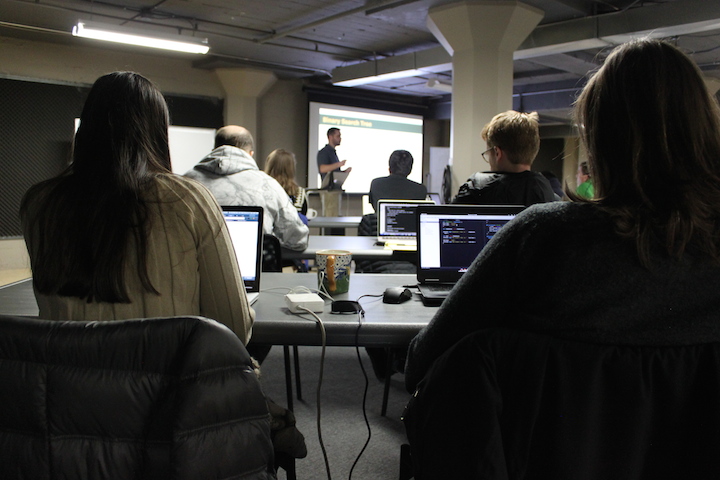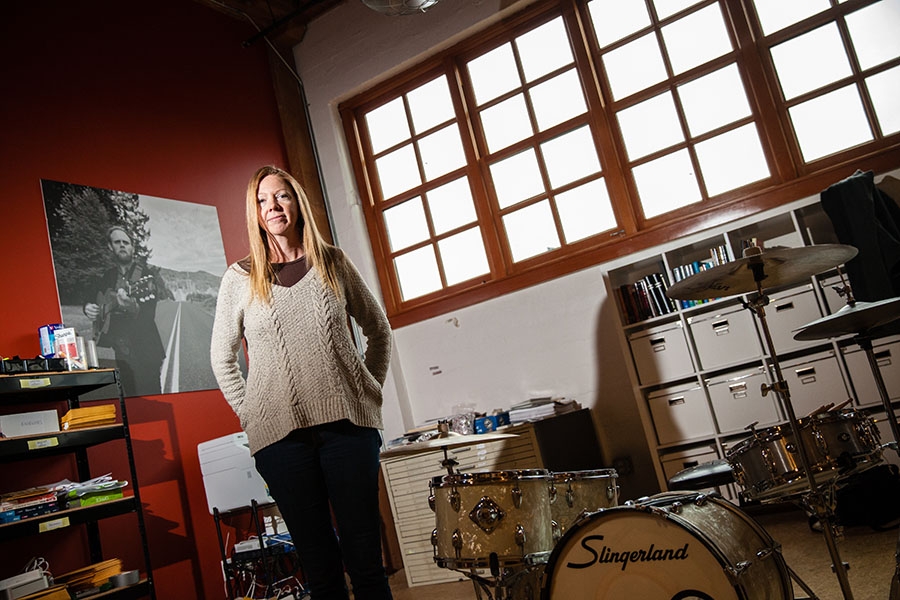The president of the record label Kill Rock Stars talks about the evolution of Portland as a music city.
Portia Sabin is sitting in her office at the Olympic Mills Commerce Center, reminiscing about the year 2006, when she lived in Olympia, managed a dance-punk band and commuted daily to the University of Washington in Seattle for a post-doctoral fellowship in anthropology.
“I was losing my mind,” says Sabin, 46.
So when Sabin’s husband, Slim Moon, asked her to take over Kill Rock Stars, an independent music label he founded in 1991, she dropped out of academia — “I thought the whole theoretical framework was totally bankrupt” — moved to New York City, where Moon had landed a new job, and started a new career as president of a music company.
“It was an exciting time, because I learned how to run a business,” Sabin recalls. “I had no MBA, and never took a business class except for running my own sole proprietorship-type management company. So it was exciting to learn the ropes of how to run a corporation.”

Eleven years later, Kill Rock Stars, which relocated to Portland in 2007, has six employees (two are part-time consultants) and releases six to 10 records a year; the latest, an album from former B-52s vocalist Cindy Wilson, “a punk-and-rock and roll icon for all of us,” Sabin says, came out this month.
Sabin herself has not abandoned her multitasking ways. She hosts a weekly podcast “The Future of What” and is the chair of a nonprofit, MusicPortland, slated to launch in January, The organization aims to bring together the disparate parts of the local music industry and “put Portland on the map as a music city,” Sabin says.
Isn’t Portland already on the map?
Yes and no. “We want to become a destination music city in the same way that Austin, Texas is a music city, Nashville, Tennessee is a music city,” Sabin says. “Cities that people think of and that Portland itself has embraced.”
RELATED COVERAGE: CELLULOID FOREST
Kill Rock Stars is definitely on the cultural radar. The punk-alternative label is famous for signing early ’90s Riot Grrrl (the underground feminist punk movement) bands like Bikini Kill, Unwound and Sleater-Kinney. Kill Rock Stars represents beloved indie-rock band The Decemberists, and its best-selling artist is the Portland singer Elliott Smith, who died in 2003.
More recently the label has moved into alternative comedy — largely by people of color, queer people, feminist voices. “It gets back to the early days of Riot Grrrl bands,” says Sabin, who played drums in a punk band — Hissyfits — while finishing her Ph.D at Columbia University. “We’re putting out stuff by people who have a perspective.”
“Putting your record on the Internet is like dropping a rock into the ocean. It makes a ripple, then disappears.”
If the label’s artistic sensibility has stayed true to its roots, the business model is in a constant state of flux, thanks to shape shifting internet platforms and monetization strategies.
“Digitization changed everything,” says Sabin. “It used to be, if we took on someone, I could say with certainty I could sell 2,000 copies of anything we put out.” Today, she says, “people don’t have to buy a copy to find out if they like it. They just go to Spotify.”
There are a few bright spots. Streaming services do provide steady income — although .004 cents per stream, which the label then shares 50/50 with the artist, doesn’t exactly qualify as riches. More lucrative per sale is vinyl, now a bona fide revenue source.
“I don’t know if it’s a kitsch thing,” Sabin says, “but a ton of people are interested in vinyl now who weren’t interested ten years ago.” She laughs.“Maybe that’s because they were only 4 then.”
In 2007 there were only five vinyl-pressing plants in the United States. That figure has grown to around 20. One of those is Cascade Record Pressing in Milwaukie, which opened in 2015.
“Legacy artists like Smith sells 80% vinyl,” Sabin says. “It’s definitely moved the needle for us.”
As the relationship between labels, artists and streaming companies continue to evolve, Sabin sees other promising developments.
“Something significant happened this year that hasn’t happened before,” she says. Streaming services in the past were unwilling to invest in musicians. Now they are “stepping up,” and putting money into marketing campaigns. “They are more like partners — instead of building a business on artists’ backs, then doing an IPO and getting rich and moving to Tahiti.”
On the other end, musicians are realizing that the promise of the internet — that it would spawn a new generation of entrepreneur-artists who don’t need labels anymore — is not exactly being fulfilled.
“Putting your record on the Internet is like dropping a rock into the ocean,” Sabin says. “It makes a ripple, then disappears.”
She relays a story about a recent podcast she produced featuring a DIY artist panel. “One of the panelists said: ‘I learned how to record my own records, become a sound engineer and producer, and how to book my own tours. And at the end of the day, all I want to do is go back to being a musician.’ So labels are necessary because artists want to be artists, and we do the business part.”

To promote the industry in the region and nationwide, Sabin serves on the board of the American Association of Independent Music and the Pacific Northwest chapter of the Recording Academy. Closer to home, she has a few agenda items for MusicPortland, namely, to expand the Oregon Office of Film into an Office of Film and Music, modeled after Seattle’s music and film agency.
“One of the cool things about Portland is that it is a maker’s city,” says Sabin, who lives in Battleground and decompresses from urban life by riding horses with her seven-year old son.
The city is home to companies that make instrument pedals and other equipment for artists, microphone manufacturers and the vinyl pressing plant. “So we have great people committed to disparate parts of the music industry. We want to say: ‘Look at all this cool stuff happening in Portland. It’s not just a bunch of bands.’”
Sabin reflects back on the pre-Kill Rock Stars years, when she enrolled in grad school because she didn’t think her mother would be happy about her becoming a punk-rock drummer.
“I didn’t think that was going to fly.”
But the independent label biz, clearly, had wings. “Independent labels are interesting in America. You have to be willing to say, this band is better than all other bands, and I’m going to put my money and resources into providing that. You have to have strong convictions about music.”
A version of this article appears in the January 2018 issue of Oregon Business magazine.


